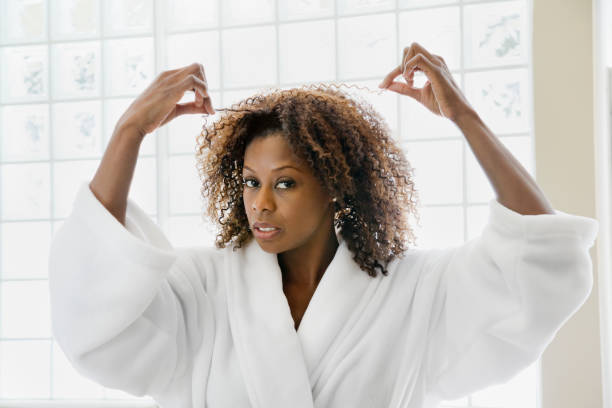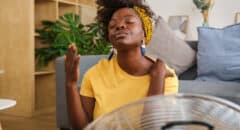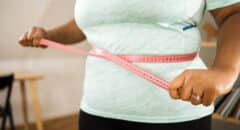
The truth is, we all know someone who has been or will be impacted by menopause. That impact could be direct or indirect, but we're all connected to a woman walking through the doors of menopause and mentally endeavoring to embrace her new life.
Most women - your mom, sister, boss, and coworker, you - will all go down the glorious path of aging that takes her through "The Change," as affectionately called by many. When women go through The Change, they experience a metamorphosis into a new life - one with no periods - which is most publicly celebrated. Often you'll see these ladies constantly fanning, using an electronic fan with the occasional water spray, chewing ice, or sweating in the coolest of temperatures.
Before a woman experiences menopause, she goes through a transitional period called perimenopause. Perimenopause means recognizing the time a woman's body naturally begins to transition to menopause. Perimenopause can start as early as the mid-30s to 40s, and it's during this time when they recognize a shift in their bodies, or should we say, "The Change" lived out through irregular periods, and vasomotor symptoms (VMS) such as hot flashes, among other symptoms.
So, we know what menopause could look like and that there is a transitional time that leads up to it, but what is menopause? The National Institute on Aging defines menopause as happening 12 months after a woman's last period. So, menopause essentially marks the end of a menstrual cycle and can only be diagnosed after a woman's gone 12 months without a menstrual period. The average age for menopause is approximately 51; however, women can experience it anytime in their 40s or 50.
Common complaints of menopausal women: trouble sleeping, hot flashes, chills, painful sex, depression, night sweats, mood swings, irregular sleep patterns, and one not so common… Hair loss! Yes, hair loss is a genuine issue directly related; however, there is a dissociation between hair loss and menopause due to a lack of awareness.
Women are often identified by their beautiful hair! From signature hairstyles to frequently changing styles - you mention a woman, and someone can tell you how they wear their hair! So, what happens when a woman starts losing her hair - the same hair she was told growing up is her glory, her crown? When a crown shifts, we adjust it; when the "crown" of hair shifts - we have learned how to adjust that too - this adjustment requires more work, but it's work that all women can do!
RELATED: Q&A: Everything Black Women Need to Know About Hair Loss
So, why do women experience hair loss during menopause and how to reduce it?
One of the primary reasons women experience hair loss during menopause is due to hormonal changes in the body. Sometimes, it's not recognized because the condition is often associated with stress, changes in diet, an illness, etc.
With other competing factors, it’s understandable why so many women miss the correlation between hair loss and menopause. Some ways to note if there is hair loss? Slower growth, thinning hair, loss of volume, thinning, changes in hair pattern, etc. - hair will normally be seen through access shedding of hair in brushes and the shower. The great news is that menopausal hair loss is reversible.
Six ways to slow down hair loss due to menopause
Eat well
When it comes to eating well, there are so many sites, books, and health gurus sharing
what to and what not to eat! This journey's focal point is knowing what works best for you. Is it a diet that contains meat, or does it strictly follow a raw vegan lifestyle?
Some foods we know to be helpful in the transitional phase of menopause that can slow down hair loss include foods rich in calcium like milk, yogurt, cheese, fortified orange, etc. Other foods to consider include oatmeal, sunflower seeds, almonds, broccoli, sweet potatoes, kiwi, papaya, and lean proteins like grilled chicken, turkey, tuna, beans, and lentils.
Stay hydrated
Drinking water is vital, especially for women experiencing VMS (hot flashes or heavy sweating) - which reduces the water in the body. In general terms, staying hydrated ensures that women can think clearly, have stable moods, and have a regular body temp that doesn’t overheat. Water also helps to lubricate joints, and eliminates waste from the body.
Get laser hair treatment
According to Women’s Health Concern, laser devices that emit low-energy laser light may stimulate hair growth to help fight thinning hair. A hairdresser or therapist best carries out laser therapy with experience and training on these devices. The long-term safety and effectiveness are unknown.
Take certain medications, vitamins, and minerals
For medications, you must always consult with your doctor before taking any medicine, especially if you’re dealing with an illness that requires medical attention.
If cleared, there are over-the-counter medicines that increase hair growth - you should research these by assessing what works best for your body. Certain supplements, such as B vitamins, are helpful for vitamins and minerals. A popular B vitamin is biotin, which has been proven to work; however, there are many others, including vitamins C and D, iron, calcium, and zinc.
RELATED: 5 Natural Remedies For Hair Loss
Get Moving - Exercise
Exercising can help manage hormone imbalances, which may contribute to menopausal hair loss. It can also reduce stress, improve sleep, and manage weight.
According to Mental Health America, getting the appropriate amount of exercise benefits nearly all aspects of a person’s health. Not getting enough exercise puts you at increased risk for several diseases.
Exercising doesn’t have to be strenuous - it could be fun, like a dance class, hiking, skating, or bike riding. For those interested in a more vigorous routine than running, weight lifting and circuit training are also quite beneficial. The point is to move - we have to move our bodies often!
Get proper rest
Mental Health America shared the importance of sleep and rest: sleep helps restore your body’s energy, repair muscle tissue, and triggers the release of hormones that affect growth and appetite.
Quality of sleep refers to how much time you spend in REM (rapid eye movement) rest. REM is the most restorative of the five sleep cycles and should account for one-fourth of the time you spend sleeping. For example, an adult who sleeps 8 hours a night should consume 2 hours of REM sleep. Deep relaxation also has many other potential benefits—it can decrease blood pressure, relieve pain, and improve your immune and cardiovascular systems.
Menopause is inevitable. Once they reach their 50s, most women may experience the other side of life free of menstrual cycles - while that part is highly celebrated, there are other factors to consider. As women go through this change, it’s essential to know the many side effects of menopause - like hair loss! The good news is that hair loss associated with menopause is reversible - when we do the work! Protect the “crown!” If you or someone you know is experiencing hair loss, look at the whole picture and ask, “is this menopause?”








